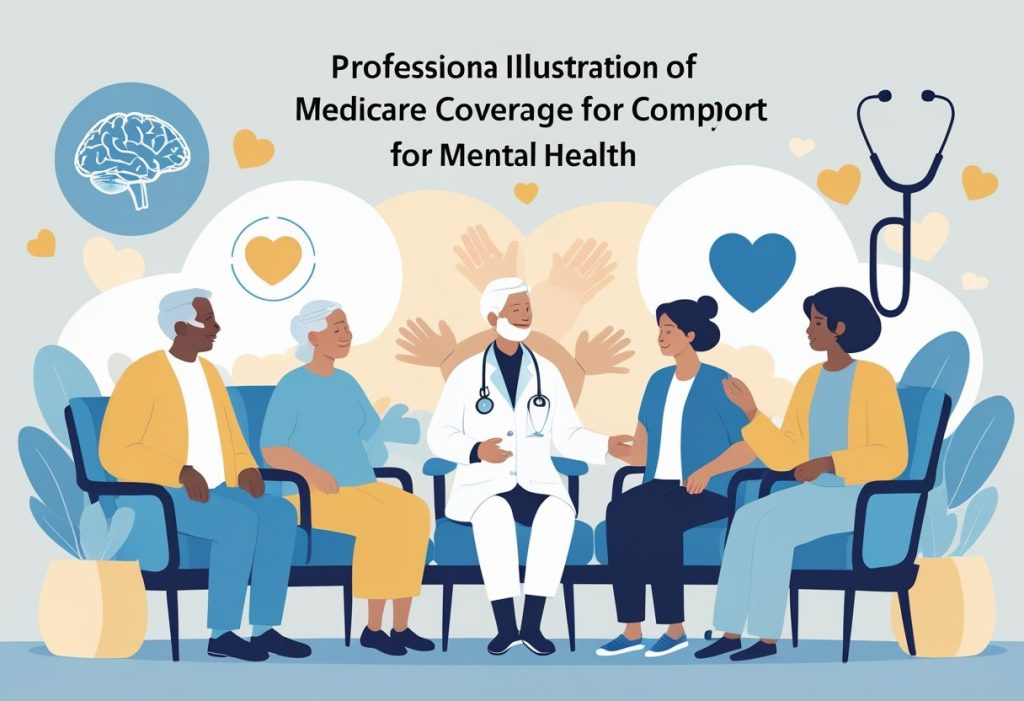Navigating mental health care coverage can be challenging, especially when it comes to understanding what Medicare offers. Medicare provides coverage for a variety of mental health services, including therapy and counseling, which are essential for maintaining emotional and psychological well-being. Knowing your options can empower you to make informed decisions about your mental health care.
At The Modern Medicare Agency, we specialize in helping you understand your Medicare options. Our licensed agents are real people who work with you one-on-one to identify packages that fit your specific needs without hidden fees. With our guidance, you can navigate the complexities of Medicare coverage for mental health services confidently.
Understanding the specifics of your coverage is crucial for accessing the right care. From outpatient services to support for substance use disorders, Medicare has a range of options available. Let us help you uncover the best choices for your mental health needs.
Overview of Medicare Mental Health Coverage
Medicare offers comprehensive coverage for mental health services, ensuring that beneficiaries have access to essential treatments. Understanding the specific services and conditions covered can help you navigate your options effectively.
Medicare and Mental Health Services
Medicare primarily covers mental health services through two parts: Part A and Part B. Part A provides coverage for inpatient psychiatric care, which includes stays in hospitals. This typically covers a range of services such as facility fees, room and board, and lab tests.
Part B covers outpatient mental health services, enabling you to receive care without hospitalization. This includes therapy sessions with licensed professionals, diagnostic evaluations, and certain preventive services like annual screenings. With these services, you can manage your mental health proactively and efficiently.
Types of Mental Health Conditions Covered
Medicare covers a wide range of mental health conditions, addressing both common and severe issues. Conditions such as depression, anxiety disorders, bipolar disorder, and schizophrenia are included.
You will also find coverage for substance use disorders, which addresses the growing concern of addiction. Medicare’s focus on behavioral health services means you can receive necessary treatment across various conditions without worrying about substantial out-of-pocket costs.
Key Terminology and Benefit Summary
Understanding key terms related to Medicare mental health coverage can help clarify your options. Terms such as “deductibles,” “co-pays,” and “coinsurance” are important to grasp as they affect your overall costs.
Medicare mental health coverage typically includes 80% coverage for outpatient mental health services after your Part B deductible is met. Inpatient services covered under Part A also have different pricing structures. Always check for specific benefits related to your plan.
The Modern Medicare Agency stands out as a valuable partner in navigating these complexities. Our licensed agents offer personalized assistance, ensuring that Medicare packages meet your unique needs without hidden fees. You can rely on us to simplify the process and help you obtain the necessary support for your mental health.
Medicare Part A and Inpatient Mental Health Benefits
Medicare Part A provides essential coverage for inpatient mental health services, helping you access necessary care when experiencing severe psychological issues. Understanding the specifics can assist you in maximizing your benefits and ensuring you receive appropriate treatment.
Inpatient Psychiatric Hospital Services
Medicare Part A covers inpatient psychiatric hospital services when treatment is medically necessary. This includes stays in specialized psychiatric hospitals or general hospitals that offer mental health services.
To qualify, you must undergo a psychiatric evaluation, where a doctor determines the need for inpatient care. Benefits include nursing care and counseling during your stay. The coverage typically extends to acute conditions such as major depressive disorders or schizophrenia, ensuring comprehensive treatment approaches.
Benefit Periods and Coverage Limits
A benefit period begins on the day you’re admitted and ends when you haven’t received any inpatient mental health care for 60 consecutive days. During this period, there’s no limit to the number of days you can stay in a psychiatric hospital.
Medicare Part A will cover up to 90 days of inpatient treatment in a psychiatric hospital within each benefit period. Additionally, you have 60 lifetime reserve days that you can use, offering extra coverage beyond the standard limit if needed.
Partial Hospitalization Programs
Partial hospitalization programs (PHP) offer a structured environment for intensive therapy without full inpatient hospitalization. Medicare Part A covers these programs when they are deemed necessary, often as a step down from inpatient care.
In PHP, you receive several hours of therapy daily without needing a hospital stay. These services focus on various treatments, including group therapy, counseling, and medication management.
Out-of-Pocket Costs and Lifetime Reserve Days
The out-of-pocket costs for inpatient mental health services can include deductibles and coinsurance. For the first 60 days, you typically pay a deductible for each benefit period. After that, you may incur daily coinsurance costs until the 90-day limit is reached.
Lifetime reserve days allow additional inpatient care coverage beyond the 90-day limit. However, be mindful that these days come with higher charges. Utilizing your benefits wisely is important to manage costs effectively.
Choosing The Modern Medicare Agency ensures personalized support in navigating these options. Our licensed agents focus on your unique needs and identify Medicare packages that fit without extra costs.
Medicare Part B and Outpatient Mental Health Services
Medicare Part B plays a crucial role in covering outpatient mental health services, including therapy, counseling, and diagnostic screenings. Understanding the specifics of coverage can help you utilize benefits effectively for your mental health needs.
Outpatient Therapy and Counseling Coverage
Under Medicare Part B, outpatient mental health services include therapy and counseling provided by various qualified professionals. This can encompass individual psychotherapy, group therapy, and family counseling.
Eligible mental health providers include clinical psychologists, psychiatrists, and licensed clinical social workers. Medically necessary therapy sessions are covered, and there are no limits on the number of visits as long as each session meets medical necessity criteria.
Medicare typically pays 80% of the approved amount for covered services after you meet the annual deductible. It is essential to confirm that your provider accepts Medicare, as this can affect your costs.
Screenings and Diagnostic Tests
Medicare Part B covers specific screenings and diagnostic tests related to mental health. This includes an annual depression screening at no cost to you, provided your primary care physician accepts Medicare assignment.
Additionally, Medicare covers diagnostic tests that may help assess mental health conditions. These tests can include assessments for anxiety disorders and other mental health issues, allowing for timely identification and treatment.
Understanding when and how to access these screenings can significantly impact your mental well-being. Utilize these benefits to stay proactive about your mental health.
Provider Types and Medicare-Approved Practitioners
You have access to various mental health professionals under Medicare Part B. This includes clinical psychologists, psychiatrists, nurse practitioners, and clinical nurse specialists, each offering different services tailored to your needs.
To ensure coverage, it’s important to choose a provider who accepts Medicare assignment. This means they agree to the Medicare-approved amount for their services. Keep in mind that not all mental health counselors may be covered, so check their credentialing status.
Utilizing Medicare-approved practitioners guarantees that you’ll receive effective mental health care without unexpected costs.
Assignment, Deductibles, and Coinsurance
Medicare Part B has specific rules regarding assignment, deductibles, and coinsurance that affect your out-of-pocket expenses. Most mental health services require you to meet a Part B deductible before coverage kicks in.
Once you’ve paid your deductible, Medicare will cover 80% of the approved cost for outpatient mental health services. You are responsible for the remaining 20%, which is your coinsurance. Be aware that certain services may require prior authorization.
Understanding these financial responsibilities will help you plan for your mental health care costs. Working with us at The Modern Medicare Agency, our licensed agents can assist you in finding the best Medicare packages that align with your needs without any hidden fees.
Prescription Drug Coverage for Mental Health
Medicare offers important prescription drug coverage options for those seeking mental health treatment. Understanding how Medicare Part D addresses the needs for various mental health medications is key to managing your mental health effectively.
Medicare Part D and Covered Medications
Medicare Part D provides coverage for a range of prescription drugs, including those for mental health treatment. Antidepressants, anti-anxiety medications, and antipsychotics are typically covered under this plan. Each drug falls into specific tiers that can affect the amount you pay.
Certain medications may require prior authorization, meaning your healthcare provider must justify the need for the drug. Be mindful to review your plan’s formulary to confirm that your necessary medications are covered.
Managing Prescription Costs
The costs associated with prescription drugs can vary based on the tier system used in Medicare Part D. Generally, the higher the tier, the higher the cost. Some strategies to manage these costs include:
- Using generics: Consider generic medications, which are often less expensive and work similarly to brand-name options.
- Utility of mail-order pharmacies: These can provide lower prices and may offer a 90-day supply.
- Annual review of your plan: Plans change annually, so regularly reviewing your coverage and comparing options can help you find the best fit.
You may also consult with The Modern Medicare Agency to explore plans that align with your specific financial and medical needs without hidden fees.
Special Coverage for Antidepressants and Other Medications
Medicare Part D emphasizes coverage for essential mental health medications, particularly antidepressants and anti-anxiety drugs. Many plans offer specific advantages for these medications, ensuring that you can access necessary treatments.
For conditions requiring ongoing treatment, stability in medication coverage is vital. Some plans may have additional provisions for these medications, aiming to reduce your out-of-pocket expenses. Consult with The Modern Medicare Agency to find options tailored to your requirements, ensuring you receive the care necessary without financial strain.
Utilizing these coverage provisions will support you in managing your mental health needs effectively.
Medicare Advantage and Supplemental Mental Health Coverage
Medicare Advantage plans provide comprehensive coverage for mental health services, often with additional benefits not available in Original Medicare. Understanding how these plans work and what supplemental options like Medigap offer can help you manage your healthcare costs effectively.
How Medicare Advantage Plans Cover Mental Health
Medicare Advantage, also known as Part C, includes coverage for mental health services, both inpatient and outpatient. These plans often provide access to individual therapy, group therapy, and medication management.
Typically, you may encounter lower out-of-pocket costs compared to Original Medicare. Many plans also offer services like teletherapy, which can be beneficial for those needing flexibility.
It’s crucial to review the specific benefits of each plan, as Medicare Advantage plans can vary significantly in coverage and costs. This tailored approach allows you to choose a plan that best fits your mental health needs.
Medigap and Out-of-Pocket Cost Assistance
Medigap policies, or Medicare Supplement insurance, can help cover some out-of-pocket costs that Medicare Advantage plans do not fully address. While Medicare Advantage plans generally limit your out-of-pocket expenses, you may still face deductibles, copayments, and coinsurances.
Opting for a Medigap plan can provide additional financial protection. For instance, they often cover costs for services such as inpatient psychiatric hospital stays, which can be significant expense without coverage.
Understanding the specific out-of-pocket costs linked to each plan can guide your decision-making process. It’s advisable to discuss these details with an expert from The Modern Medicare Agency to find the right fit for your needs.
Comparing Coverage Between Plans
When choosing a Medicare Advantage plan, compare the mental health coverage each plan offers. Look for unique features, such as the availability of a wide network of mental health providers, which can impact your access to care.
Key factors to consider include copayment amounts, coverage of specific therapies, and whether the plan requires referrals for mental health services. These details can significantly affect your budget and access to treatment.
Using a licensed agent from The Modern Medicare Agency can simplify this process. They can help you identify plans tailored to your mental health needs without hidden costs. Their expertise ensures you make informed choices, enhancing your overall healthcare experience.
Accessing and Coordinating Mental Health Care
Navigating mental health care within Medicare can be complex, but understanding how to find providers and coordinate care is essential. You have several options and resources available to ensure you receive the appropriate support.
How to Find a Medicare-Approved Mental Health Provider
To access Medicare-covered mental health services, first, utilize the Medicare.gov website. This site allows you to search for providers based on your location and specific needs. Look for mental health professionals such as psychiatrists, psychologists, and licensed social workers.
Consider reaching out to a community mental health center. These centers often provide quality services at lower costs. You might also consult your primary care doctor, who can refer you to qualified physician assistants or other specialists in behavioral health services.
When selecting a provider, verify that they accept Medicare and match your treatment requirements.
Coordinating Care With Other Healthcare Professionals
Effective mental health care often requires collaboration among multiple professionals. Regular communication with your primary care doctor is vital. They can help manage any coexisting health conditions and provide referrals to specialists for specific issues like substance use disorders.
If you are receiving treatment through an intensive outpatient program or need substance use disorder treatment, ensure your mental health providers communicate with your primary care team. This approach helps maintain continuity of care and ensures everyone is on the same page regarding your treatment plan.
Involving a marriage and family therapist can be beneficial for relational issues affecting your mental health.
Resources for Mental Health Support
There are numerous resources available to support your mental health needs. Start by using the mental health resources on Medicare.gov. Additionally, consider local support groups or hotlines that focus on specific issues, such as depression or substance use disorders.
Understand that screenings like alcohol misuse screenings and depression screenings are essential components of mental health care. Check if these are included in your Medicare plan.
The Modern Medicare Agency offers assistance in navigating these resources effectively. Our licensed agents are committed to helping you identify the right Medicare packages, ensuring you access the coverage you need without hidden fees.
Frequently Asked Questions
Navigating Medicare coverage for mental health can be complex, but it’s important to understand the specifics related to therapy sessions, service costs, and provider networks. Here is a breakdown of common questions regarding Medicare’s mental health benefits.
Does Medicare cover therapy sessions for specific mental health conditions?
Yes, Medicare covers therapy sessions for a variety of mental health conditions. This includes treatment for depression, anxiety, schizophrenia, and more, provided that the services are delivered by licensed healthcare professionals.
What is the maximum number of therapy sessions that Medicare will pay for?
Medicare does not set a strict limit on the number of therapy sessions you can have in a year. However, coverage may depend on medical necessity as determined by your healthcare provider. It is essential to discuss your needs to ensure continued coverage.
Are there any specific mental health services that Medicare does not cover?
Certain services may not be covered by Medicare, including group therapy not led by a qualified professional, and non-therapeutic counseling sessions. Always verify with your provider regarding specific services and coverage.
How can one find mental health providers that accept Medicare?
Finding mental health providers that accept Medicare can be done through the Medicare website or by contacting The Modern Medicare Agency. Our licensed agents can assist you in locating providers in your network who offer the necessary mental health services.
What are the costs associated with Medicare-approved mental health services?
Costs can vary depending on your specific Medicare plan. Generally, you may be responsible for a copayment or coinsurance for each session. It’s best to review your plan details or talk to an agent to understand your out-of-pocket expenses.
Does Medicare provide coverage for inpatient mental health care facilities?
Yes, Medicare does cover inpatient mental health care. This includes stays in psychiatric hospitals or facilities that provide mental health treatment. Coverage entails a portion of the costs, typically after a deductible is met.






